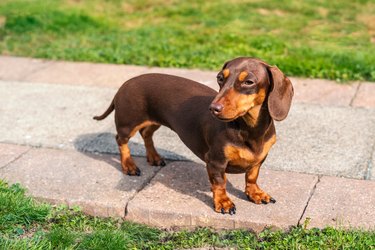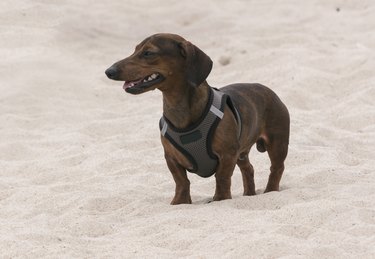Dachshunds may be small, but clearly, no one has told them that. Brave and loyal, these spunky little dogs will follow you to the ends of the earth unless you plan to get there by swimming or running — two activities that their short little legs make quite a challenge. Though almost nothing else stops these determined dogs, excess weight can and does. This is a breed that handles extra pounds poorly, so you'll need to keep a close eye on your pet's waistline.

Video of the Day
What your dachshund should weigh
To determine your dachshund's ideal weight, you first need to know what kind you have. How big do dachshunds get? A standard dachshund is one who stands 8 to 9 inches tall upon reaching adulthood and ideally weighs between 16 and 32 pounds. Smaller dogs, standing only 5 to 6 inches high, are known as miniature dachshunds. Miniature dachshunds weigh up to 11 pounds.
Video of the Day
Miniature and standard dachshunds are part of the same breed, making it hard to predict what a puppy will grow up to be. Two miniature dachshunds can breed and produce a standard dachshund and vice versa. This makes it hard to say exactly what your puppy should weigh at any given moment. Typically, however, a 5-month-old standard dachshund puppy will weigh between 10 and 20 pounds, while miniature dachshunds will only weigh between 7 and 9 pounds when they are five months old. Keep in mind that weights will vary from dog to dog, and your veterinarian will best be able to determine if your puppy is maintaining a healthy weight. Therefore, regular checkups are important.
Ultimately weight can only tell you so much about your canine companion's health, and weight can vary based on size and your particular dog's conformation. It's an important measurement, but it's also important to monitor your dog's overall body condition. Ask your veterinarian if body condition scores might be a good way to assess the body fat on your dog. These scores work by assigning a numerical score to your dog's appearance by utilizing a body condition score chart.
Monitor your dog's weight and body condition to determine whether they are at a healthy weight. Your dachshund's chest bone should stick out a bit, with a small dimple on each side. Their spine should visibly arch slightly behind their ribs, and their waistline should be visible, tapering upward toward their back. If you see a round waist and have to poke through a layer of fat to feel your dog's ribs, they are probably overweight.

Why a dachshund's weight matters
Carrying around extra pounds isn't good for any dog, but overweight dachshunds may suffer more than other breeds. They are prone to health conditions that can compromise their quality of life. Overweight dogs face an increased risk of diabetes, arthritis, hypertension, joint degeneration, heart disease, and cancer, among other things. They also have a greater risk of injury, increased risk of overheating, and greater anesthetic risks. Obese dogs live shorter lives and experience a diminished quality of life along the way.
If a dachshund is overweight, they may have a harder time recovering from intervertebral disc disease, a degenerative spinal disease that can lead to pain, a loss of mobility, and even paralysis. They are more vulnerable to developing this debilitating condition because they have been bred to have abnormal growth and cartilage formation in their skeletal system. Although obesity has not been linked to whether or not a dachshund develops intervertebral disc disease, it can negatively impact how quickly they recover from it. That's another reason why keeping your dachshund at a healthy, active weight is an important part of caring for them.

Dealing with an overweight doxie
Although treats are perfectly fine in moderation, making sure your dachshund eats a healthy, balanced diet is best. It's best for your dog to avoid weight gain altogether. However, if they are already overweight, the good news is that you can help them get back to a healthy weight! Start by cutting back on the treats and eliminating table scraps completely. If you do want to offer your dog a treat, give them a green bean, baby carrot, or other healthy snacks.
To encourage weight loss, you'll generally need to feed your dog less food than they are getting now. Determine how much food your dog needs by calculating your dog's energy requirements and seeing how much of a calorie deficit is needed for slow, healthy weight loss. Then be sure to feed your dog the right amount of calories per day. Keep in mind that this should be a gradual transition because suddenly cutting down on your dog's daily food can cause anxiety and distress for your dog. It's best to transition onto the new diet during the course of a week.
Keep in mind that you should take your doxie to their veterinarian for a check-up before making a change, and ask your veterinarian to help you determine the best weight loss plan and how many calories you need to cut from your dog's daily diet. Do not start your dog on a diet without having them examined by a veterinarian first, since some diseases can cause weight gain.
You can also help your dachshund lose weight by getting the little couch potato up and moving. This small but mighty breed needs two moderately long walks a day to maintain an optimal weight and build muscle. Avoid lots of stairs during your workouts, however, as frequent trips up and down them can be difficult for this short breed.